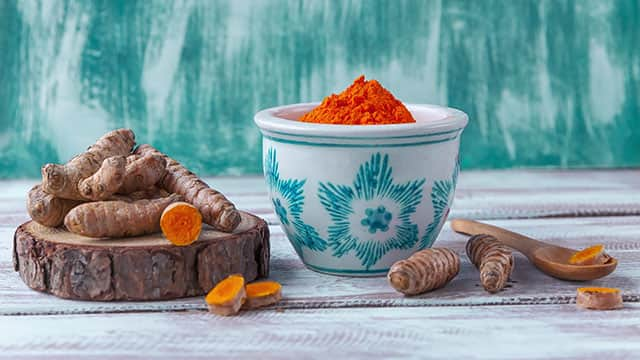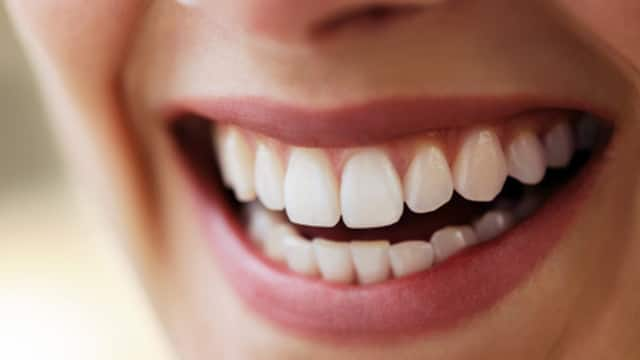What Is Turmeric?
With origins in Southeast Asia and India, Turmeric belongs to the ginger family and derives from an herb called the Curcuma Longa. Turmeric is typically orange with a root-like structure, but you can find it in various forms — like dry yellow powder, tablets, or a liquid extract.
TIP: The terms turmeric, curcuma, and curcumin are often used interchangeably, so try to group them during research.
What Are the Benefits of Turmeric for Oral Health?
Turmeric has antimicrobial, antioxidant, astringent, and other useful properties, it is quite useful in Dentistry also. According to the Indian Journal of Dental Research, turmeric makes gums and teeth strong, and it can be used for relief from dental problems such as pain and swelling, gingivitis and periodontitis. Find out how using turmeric for infected gums might be an effective remedy for your periodontal woes.
- Anti-Inflammatory Effects
Many oral care studies have evaluated the effects of turmeric on gingivitis patients and found it helpful in reducing inflammation. A study published in the IOSR Journal of Dental and Medical Sciences (IOSR-JDMS) concluded that, gel containing curcuma longa extract was efficient in treating gingivitis by reducing its inflammatory components. A research study published in the Journal of Pharmaceutical Sciences and Research notes that, in dentistry, curcumin is known to have a wide range of uses, it is used as a pit and fissure sealant, plaque detecting agent, an analgesic agent, mouthwash, onco-protective and last but not the least in periodontal therapy. Curcumin being a naturally occurring anti-microbial and anti-inflammatory agent with diverse medicinal properties. Its role in improving periodontal status was proved by various in-vitro and in-vivo studies. The science on turmeric’s anti-inflammatory effects is still emerging but looks promising. If you'd like to try a more natural remedy for gingivitis, talk to your dentist about using a product containing turmeric. - Plaque Control
This multi-faceted spice isn’t just for gums. Studies suggest that you can potentially use turmeric for teeth plaque and build-up. A research study published in The Journal of Contemporary Dental Practice notes that turmeric mouthwash can be effectively used as an adjunct to mechanical plaque control methods in prevention of plaque and gingivitis. The science for this, while emerging, also looks promising. For sure-fire protection against plaque, you'll need to stick with fluoride toothpaste, but feel free to try a formula with turmeric for added anti-plaque benefits. - Other Potential
According to the Indian Journal of Dental Research, the active constituent of turmeric is known as curcumin. It has been shown to have a wide range of therapeutic actions of curcumin. Its benefits includes analgesic, antibacterial, anti-inflammatory, anti-tumour, anti-allergic, antioxidant, antiseptic, antispasmodic, appetiser, astringent, cardiovascular, carminative, cholagogue, digestive, and diuretic. There are many uses of turmeric in dentistry. The use of plants and herbs for dental care is a very common indigenous system of medicine and we must include it in our everyday life. Although further research is needed for the proper use of turmeric in Dentistry.
Can Turmeric Whiten Your Teeth?
We've covered the health benefits of turmeric, but does it have cosmetic benefits as well? Unfortunately, as the American Dental Association (ADA) mentions, there's no scientific evidence that turmeric can whiten your teeth. Many turmeric toothpaste includes ingredients like baking soda, hydrated silica, or calcium carbonate, which are known as natural whitening agents and might be what's actually contributing to a brighter smile.
If it doesn't whiten, then can turmeric stain your teeth? Probably not. Though turmeric has a pretty intense yellow colour, you would need to eat or drink it regularly for it to stain your teeth. Plus, brushing your teeth twice a day and cleaning between teeth daily can help prevent those surface stains. If you want whiter teeth, try some clinically proven teeth whitening methods.
Should You Use Turmeric on Your Teeth?
Even though turmeric has its roots in history, it has countless uses beyond seasoning in the modern world. From treating gingivitis to helping reduce plaque, emerging research shows that turmeric could play a part in your oral health. Still, as promising as the research on turmeric may be, remember that DIY remedies should never replace proper brushing and flossing practices. You should always speak with your dental professional before changing your oral care routine. Your dental professional can help you explore both new and natural ways to care for your smile.
This article is intended to promote understanding of and knowledge about general oral health topics. It is not intended to be a substitute for professional advice, diagnosis or treatment. Always seek the advice of your dentist or other qualified healthcare provider with any questions you may have regarding a medical condition or treatment.
ORAL HEALTH QUIZ
What's behind your smile?
Take our Oral Health assessment to get the most from your oral care routine
ORAL HEALTH QUIZ
What's behind your smile?
Take our Oral Health assessment to get the most from your oral care routine













